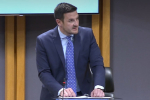Earlier this year, NRW and Welsh Government ran a consultation on their proposals to licence gamebird releases in Wales. With over 42,000 responses and realising the strength of feeling on this from rural communities, NRW announced in September that their plans were on ‘hold’. Yet this week, James Evans MS has learnt that NRW has submitted evidence to Ministers to request they add the common pheasant and red-legged partridge to Part 1, Schedule 9 of the Wildlife and Countryside Act 1981 in Wales. Part 1 lists non-native species that are already established in the wild but may pose a conservation threat to native bio-diversity and habitats. By including common pheasants and red-legged partridges in the list of ‘non-native species’ this will mean any release would have to be licenced by NRW. If Welsh Government Ministers approve this, it is expected to be in place for the 2025/26 shooting season.
Figures show that shooting has conservation benefits, such as the management of 380,000 hectares in Wales. Shooting contributes an annual spend of £7.4m on conservation across Wales, the equivalent of 490 fulltime jobs or 120,000 conservation working days. Shooting also has massive benefits for the economy in Wales contributing £75 million to the economy and there are 2,900 shooting-related businesses across the country directly supporting the equivalent of 2,400 full-time jobs, supporting rural economies.
James Evans MS said: “The consultation that was held by NRW showed that people were overwhelmingly opposed to these regulations. NRW’s engagement and evidence gathering in 2022 gave no due regard to the evidence from the likes of the Countryside Alliance or BASC. It was clear from the Minister Julie James MS response in the Chamber in April that she has an anti-shooting, anti-rural agenda that is not based on factual evidence just political ideology. I will do what I can to bring this matter to a vote in the Senedd to make sure the people of rural Wales have a voice”


